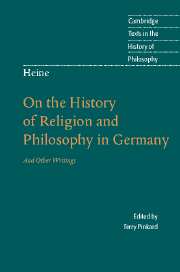Book contents
- Frontmatter
- Contents
- Introduction
- Chronology
- Further reading
- Translator's note
- On the History of Religion and Philosophy in Germany
- Other writings
- From a letter to Moses Moser in Berlin, May 23, 1823
- From The Songbook (1827), “Return home”
- From The Songbook (1827), “North sea: second cycle”
- From Lucca, the City (in Travel Pictures, Part IV, 1831)
- From the Introduction to “Kahldorf on the Nobility in Letters to Count M. von Moltke” (1831)
- From The Romantic School (1835)
- From New Poems (1844), “Poems of the Times,” “Doctrine”
- From the Letters about Germany (1844)
- From the “Afterword” to Romanzero (1851)
- From Confessions (1854)
- Index
- Cambridge Texts in the History of Philosophy
From Confessions (1854)
Published online by Cambridge University Press: 05 June 2012
- Frontmatter
- Contents
- Introduction
- Chronology
- Further reading
- Translator's note
- On the History of Religion and Philosophy in Germany
- Other writings
- From a letter to Moses Moser in Berlin, May 23, 1823
- From The Songbook (1827), “Return home”
- From The Songbook (1827), “North sea: second cycle”
- From Lucca, the City (in Travel Pictures, Part IV, 1831)
- From the Introduction to “Kahldorf on the Nobility in Letters to Count M. von Moltke” (1831)
- From The Romantic School (1835)
- From New Poems (1844), “Poems of the Times,” “Doctrine”
- From the Letters about Germany (1844)
- From the “Afterword” to Romanzero (1851)
- From Confessions (1854)
- Index
- Cambridge Texts in the History of Philosophy
Summary
A clever Frenchman – a few years ago the expression would have been redundant – once called me a romantic défroqué. I have a weakness for everything clever, and as malicious as this name was, it nonetheless delighted me greatly. It hit the mark. Despite my exterminatory campaigns against romanticism, I myself remained a romantic, and was to a much greater degree than I suspected. After I had delivered the most mortal blows to the appreciation of romantic poetry in Germany, an infinite longing for the blue flower in the dreamland of romanticism crept over me, and I seized the enchanted lute and sang a song in which I abandoned myself to all of the lovely exaggerations, all the moonlight drunkenness, all of the blossoming nightingale madness of that once so-loved fashion. I know, it was “the last free forest song of romanticism,” and I am its last poet: with me the old lyrical school of the Germans ends, while at the same time the new school, modern German poetry, begins with me. German literary historians attribute this double importance to me. It is unseemly for me to go on too long about this, but I may say with ample justification that I deserve great mention in the history of German romanticism. For this reason, I really ought to have provided a discussion of my own self in the book De l'Allemagne, where I attempted to portray the history of the romantic school as completely as possible.
- Type
- Chapter
- Information
- Heine: 'On the History of Religion and Philosophy in Germany' , pp. 203 - 215Publisher: Cambridge University PressPrint publication year: 2007



